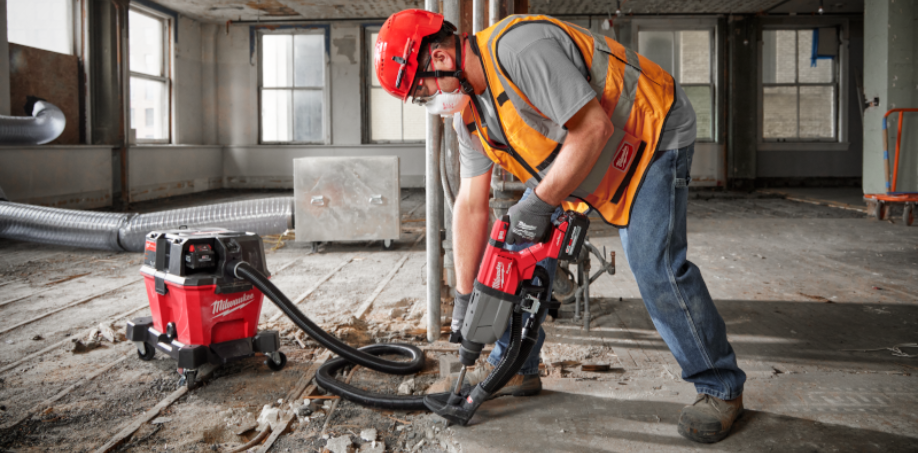Few tools are as indispensable as the rotary hammer drill on construction sites where the drill’s ability to deliver high-impact drilling in tough mat
Few tools are as indispensable as the rotary hammer drill on construction sites where the drill’s ability to deliver high-impact drilling in tough materials like concrete, brick and stone are indispensable.
They are essential for builders who need to bore precise holes or undertake heavy-duty demolition work. Unlike standard hammer drills, rotary hammers utilise a piston-driven mechanism that delivers more force per impact and making them ideal for more demanding applications in the concrete and construction industry.
Rotary hammer drills operate using an electro-pneumatic system, where an electric motor drives a piston that compresses air to create a hammering motion. This design allows for greater impact energy, enabling the tool to break through dense materials with minimal user effort. Most rotary hammer drills feature three operational modes:
1. Drilling Mode – Functions like a standard drill, suitable for light-duty applications in wood or metal.
2. Hammer Drilling Mode – Combines rotation with percussive force, making it ideal for drilling into masonry and concrete.
3. Chiselling Mode – Disables rotation and uses only the hammering action, effectively turning the tool into a mini jackhammer for demolition work.
Modern rotary hammer drills are packed with features that improve efficiency and safety. Some of the most notable include:
• SDS (Slotted Drive System) Compatibility – Most rotary hammers use SDS-Plus or SDS-Max shanks, allowing for better bit retention and quick bit changes without a chuck key.
• Variable Speed and Impact Control – Enables precision in different applications, from delicate surface work to heavy-duty drilling.
• Anti-Vibration Technology – Reduces operator fatigue by minimizing vibration transfer.
• Dust Extraction Systems – Improve worksite cleanliness and safety by reducing airborne silica dust, a common health hazard in construction.
Rotary hammer drills have a broad range of applications in the construction industry. Their ability to drill and chisel through concrete and masonry makes them invaluable for various tasks such as:
1. Anchor Installation
Rotary hammer drills are commonly used to create anchor points in concrete for securing heavy-duty fasteners, such as expansion bolts, threaded rods and rebar dowels. These anchors are essential for constructing steel structures, installing machinery and setting up railings and fixtures.
2. Demolition and Chiselling
Thanks to the chiselling mode, rotary hammers can be used for light to medium demolition work, such as removing old tile, breaking up concrete slabs or cutting channels for electrical conduits. This functionality makes them a versatile alternative to larger jackhammers for smaller demolition projects.
3. Drilling Holes for Plumbing and Electrical Installations
Plumbers and electricians frequently rely on rotary hammers to drill holes through concrete walls and floors for running pipes and conduit systems. Their efficiency in penetrating dense materials significantly reduces labour time and effort.
4. Concrete Formwork and Rebar Doweling
Before pouring new concrete slabs or extending existing structures, contractors may use rotary hammers to drill holes for rebar doweling. This reinforcement technique enhances the strength and stability of concrete joints and prevents structural failure.
5. Masonry and Brickwork
Masons and builders use rotary hammers to create openings in brick and block walls for doors, windows and ventilation systems. These drills ensure clean, precise cuts that facilitate seamless installations.
6. Road and Bridge Construction
Infrastructure projects, such as road and bridge construction, require drilling into concrete and asphalt for anchoring structural components. Rotary hammers are essential for these large-scale applications, ensuring durability and precision in construction.
Selecting the right rotary hammer drill depends on the nature of the job. Key considerations usually relate to power rating, which is measured in joules, impact energy determines the tool’s effectiveness in breaking through tough materials.
The drill type is important whether it is for SDS-Plus models that are suitable for standard construction work or SDS-Max models provide more power for heavy-duty applications. The weight and ergonomics also play a role. A lighter tool reduces user fatigue for prolonged use, while a well-balanced design enhances control and comfort.

